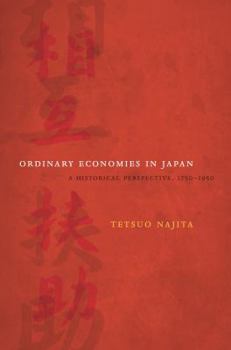Ordinary Economies in Japan: A Historical Perspective, 1750-1950 Volume 18
(Book #18 in the Twentieth Century Japan: The Emergence of a World Power Series)
Tetsuo Najita explores a powerful theme in the economic thought and practice of ordinary citizens in late Tokugawa and early modern Japan. He examines commoners' writings on the virtues of commerce, the reconstruction of villages, and groups offering credit and loans, particularly the traditional cooperative, the ko, which citizens created to save one another in times of famine and fiscal emergency without turning to their government. The alternative...
Format:Hardcover
Language:English
ISBN:0520260384
ISBN13:9780520260382
Release Date:September 2009
Publisher:University of California Press
Length:298 Pages
Weight:1.27 lbs.
Dimensions:1.0" x 6.2" x 9.0"
Related Subjects
Asia Business Business & Finance Business & Investing Economic Conditions Economics History JapanCustomer Reviews
0 rating





